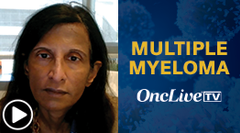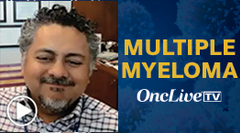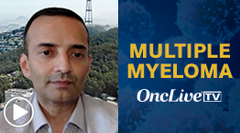
Dr Usmani on Challenges With Bispecifics and CAR T-Cell Therapies in Multiple Myeloma

Saad Z. Usmani, MD, MBA, FACP, FASCO, discusses challenges of integrating bispecific antibodies and CAR T-cell therapies into the community for myeloma.
Saad Z. Usmani, MD, MBA, FACP, FASCO, chief, Myeloma Service, Memorial Sloan Kettering Cancer Center, discusses the challenges of integrating bispecific antibodies and CAR T-cell therapies into the community setting for patients with multiple myeloma.
The utilization of bispecific antibodies for multiple myeloma in the community setting is expected to grow, but it will require a learning curve as clinicians outside of academic centers become more familiar with the data and logistics of these therapies, Usmani begins. With time, and as more bispecifics are approved for additional indications, including solid tumors, there will likely be increased motivation for community oncologists to adopt these therapies, he states. This adoption will be crucial as bispecific antibodies move beyond academic centers and into broader use across various settings, Usmani emphasizes.
When it comes to CAR T-cell therapy, access remains one of the biggest challenges, particularly as these therapies move into second-line treatment and beyond, he continues. Although there is significant potential for utilizing CAR T-cell therapies earlier in the treatment course, ensuring patient access requires enhanced communication and collaboration between community oncologists and the transplant and cell therapy centers, Usmani notes. These centers have the capacity to deliver CAR T-cell therapies but often require close coordination when physicians refer patients to ensure timely and appropriate treatment, he details.
Another important factor is advocating for greater resources and expanded capacity both at the level of industry sponsors and within the cell therapy centers themselves, Usmani says. As more patients become eligible for CAR T-cell therapy, the demand on these specialized centers will increase, he explains. By working together, the community and academic centers can address these logistical challenges, ensuring that patients have improved access to the transformative potential of bispecific antibodies and CAR T-cell therapies in multiple myeloma, Usmani concludes.









































